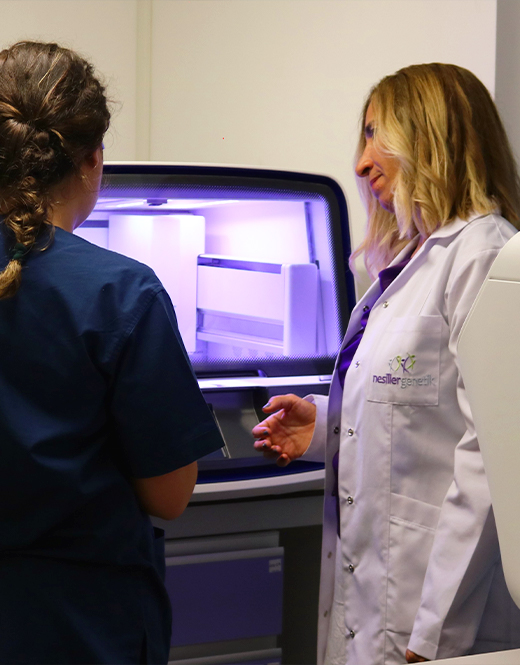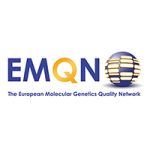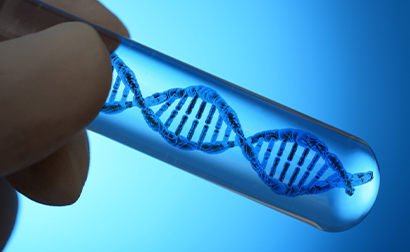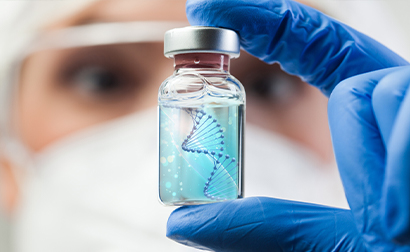Our goal is to obtain the most accurate information that we know will fundamentally affect individuals' lives and to provide clinicians with the most reliable advice for their decisions.
Please enter subscribe form shortcode
Please enter instagram feed shortcode

The results achieved by our genetic diagnosis and consulting center over the past 15 years, in our specialty fields of cancer, healthy child and undiagnosed diseases, demonstrates our improving quality and competence.









In an online or face-to-face meeting -based on your demand-, our geneticist will interpret the genetic information about your test results by taking into consideration your clinical history and will help you understand its consequences. If desired, the same service can be offered to physicians in various fields, by supporting them to choose the right test and to provide detailed analysis.

Not every type of cancer progresses in the same way in every patient. Although cancer has certain patterns, it is a personalized disease. Tumor profiling tests analyze thousands of genes found in cancer cells. Based on this information, the most appropriate treatment method for the patient is determined and implemented.
![]()

One of the main factors of infertility and recurrent miscarriages are mutations in the mother and/or father. These genetic changes can affect sperm or egg production and, if passed on to the fetus, it can result in miscarriage. Genetic tests, performed on the embryos of prospective parents and during the IVF process, will help you to deliver a healthy child.

Whole Exome Sequencing (WES), performed on approximately 20,000 genes that make up the human genome, helps to identify existing diseases and genes at a risk of disease. The WES can be a guide for early diagnosis and prevention of diseases and an explanation for many challenging health conditions.
![]()

Many rare diseases are caused by mutations in our genes. Genetic tests facilitate the diagnosis, follow-up and treatment of the disease; questions such as hereditary status, the possibility of symptoms not yet seen, and what the person can do to maintain quality of life are largely answered and uncertainties are eliminated.

Common diseases such as heart, kidney and lung diseases, mental disorders such as Alzheimer's, obesity and diabetes, as well as other chromosomal diseases are also within the expertise of our genetics laboratory. Identifying the genetic origin of diseases allows the development of more effective treatments and personalized approaches.

Pharmacogenetics is defined as the interaction of the drug with the genetic makeup of the individual. Pharmacogenetic tests provide genetic information about the patient's age, weight, comorbidities, other medications, general health status and environment. The results are helpful for doctors to choose the "best medicine at the appropriate dose".

Our genetic tests can provide insights into how your body processes different nutrients, such as carbohydrates, fats and vitamins, and how your genes may influence how likely you are to respond to certain diets or exercise programs. You can also benefit from sports genetics testing, identifying genetic traits that can affect your performance, risk of injury and recovery.
Genetic tests based on examination of genes, which may be called "the map of our body", help to determine whether we carry a particular disease,
It can help clinicians to determine whether we are predisposed to any risks, what to expect in the womb or in our newborn child, or how to treat an existing disease.

The result of a genetic test shows the health picture not only for you but also for your future generations.
Why do we need genetic testing for cancer?
Cancer is a genetic disease and due to the genetic differences of individuals, everyone's cancer is different even cancer is detected in the same organ. Progression, response to treatment, possible side effects and outcomes are also different....
What is the importance of personalized medicine in cancer diagnosis and treatment?
Personalized medicine in oncology is a method by which competent health professionals (oncologists, molecular biologists, genetic counselors, pathologists and pharmacologists) can plan tailored care for their patients based on the individual's genes....
I have sent my sample and paid my fee, what is the procedure now?
After the fullfilled documents of the test requested and the sample are received by our laboratory, payment is going to be done and your records to be entered to our system. If there is missing information at this point, you will be contacted...
Why do we need genetic testing to have healthy children?
Factors such as maternal or paternal infertility, inherited genetic diseases and advanced maternal age greatly affect the success of pregnancy and the chance of normal delivery. Your clinic and health history will be interpreted by your doctor and possible causes and treatments will be investigated...
Could the cause of repeated miscarriages be genetic?
Under standart conditions, the fertilized egg attaches and grows in the uterine wall. Genetic differences in the fetus can lead to problems of growth, development and attachment...
Why are genetic tests needed for rare diseases?
The role of genetics is crucial for diagnosing almost all rare diseases, but it also plays a role in understanding the underlying mechanisms and developing effective treatments...


Born in 1971, Dr. Özgön completed her secondary and high school education at Istanbul Italian High School. After graduating from I.U. Cerrahpaşa Faculty of Medicine in 1997, she received her specialization in pharmacology and clinical pharmacology at the same university and her doctorate degree in medical genetics, which is a joint program of I.U. Istanbul Medical and Cerrahpaşa Medical Faculties.




genetics lab
